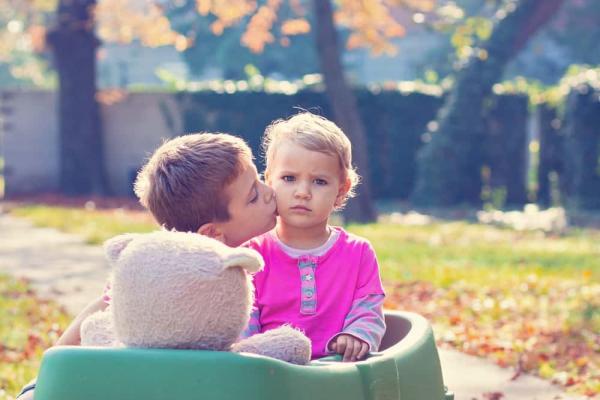
When the school bus drove away with my daughter, my younger son sank on the sidewalk in despair. They have always been close, and he felt like it had to be a mistake that he wasn't going with her on the bus.
Having the older child away at school for part of the day can be an opportunity for parents and younger children who have always had an older sibling at home to share one-on-one time. As my mother said, "It's his turn to be with you."
Set the tone
If you are in a good mood, chances are your child will be in a good mood, too. When older children head off to school, a little reassurance for the younger child will go a long way. Telling him "Sister is going to school, but she will be home soon and we will play with her later," can help him feel that it will be all right.
Let your younger child know that nothing has changed, even if Big Sister is away at school. A hug and an "I love you" can be comforting during a shift in routine. Setting him on your lap, reading him a story and letting him know the plans you have made for the two of you that day will help him feel secure about the change.
Put him on a schedule, too
Sticking to a simple schedule will help your younger child know what to expect. Have a set time for meals, chores and activities. This will be good training for when he enters Kindergarten. Help him learn that there's a time to work, a time to play and a time to rest.
Young children do not transition between activities as well as adults. Rehearse what's coming next: "Right now, we are going to have breakfast. After breakfast, we are going to get dressed." Then, when breakfast is almost done, "In two minutes, we are going to put breakfast away and get dressed." You'd be surprised how few tantrums and meltdowns occur just because the child knows what to expect next.
Plan sensory activities to do together
When we brought our identical twin boys home, my 3-year-old felt displaced and overwhelmed. Our pediatrician gave me some good advice. He said, "Plan on spending one-on-one time each day with your son for 15 minutes while the twins sleep." A little time and consistency made an enormous difference in how my son felt about the situation. I have found that this can apply to when Big Sister is away at school as well.
The Internet has an endless supply of creative ideas and sensory activities. When it's too cold to play outside, fill a cardboard box with dry oatmeal and have him play with his toy trucks in the "dirt." Make a salt dough pumpkin and display it for Halloween. Just 15 minutes a day together will make the playtime so much more enjoyable for your child.
Invite a friend to go outside
Even younger children need to meet and play with friends, and it's good for parents, too. Find a parent with a younger child at home in your neighborhood and set a play date at the park or at your home. Go for walks together. Demonstrating to your child how to make new friends and how to talk to new people will help him become socially adjusted.
As you walk, point out the new scenery to your child. Describe the colors, the sights and the sounds that you hear on your walk. When friends go home, review what happened with your child: "Wasn't it fun with so-and-so? Weren't the leaves beautiful on our walk today?" The fresh air and social interaction will be healthy for both of you.
Quiet time
Nap or quiet time needs to be at a consistent time every single day and should not be too long. Give your child a favorite pillow or blanket and some stuffed animals. Have your child choose a story for you to read - his choice. Tell your child what makes him special and why you are so happy to have him in your family.
Quiet time can be the best part of the day, especially for the parent. I usually use it to catch up on some things I need to get done before Big Sister comes home from school or to do something that interests me while I have a moment to myself. It also can help your younger child decompress and maybe catch some shut-eye before Big Brother or Big Sister comes home from school.

